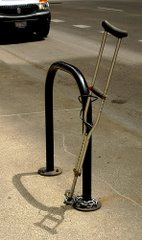 I'm torn about how to deal with this story in the New York Times. It has 'So Courageous!' written all over it, but I can't help but love it.
I'm torn about how to deal with this story in the New York Times. It has 'So Courageous!' written all over it, but I can't help but love it. "[Dustin] Carter, 18, is a 103-pounder whose legs end at his hips, whose right arm stops just after his elbow and whose left arm is even shorter." In this story we learn that he has won enough matches to go onto the Ohio Division II wrestling competition.
Dustin of course eschews being treated differently even though the article implicitly does so by calling him out for his accomplishment. Given my normal track record on these stories, I expected to snub this story but I just couldn't see it the same way. I think that the written article does fit the pattern that I've discussed before. However, I think I'm able to see past the so courageous, 'my hero', and 'miracle' stuff that the story conveys, to a simpler story, one where a young man achieved something that he cared deeply about. Forget about his special challenges. Let's praise him because he accomplished his dream. How could you not be moved by that...
"When time finally ran out during his consolation semifinals match against Dustin Davidson, the scoreboard showed a 3-1 victory for Carter. Knowing the victory had landed him in the state tournament, he scurried to the middle of the mat, lifted his head toward the ceiling and roared. Not once, but twice.
'I’ll never forget it,' Carter said. 'I’ve been waiting for this too long. It was my last chance. I’ve been struggling to sleep all weekend. I’ve been dreaming about my matches. It’s stayed in my head too long. That was everything coming out.'
His family, wearing buttons with pictures of Carter, surrounded him as he galloped to his father and leaped into his arms. They cried into each other’s shoulders. The friends and family who surrounded them shed tears, as well.
'I don’t think I’ve ever felt such elation in my life,' Lori Carter said, struggling to keep her voice steady. 'He’s worked so hard. After everything he’s been through, he deserves his dream.' "
That's the real story here.

